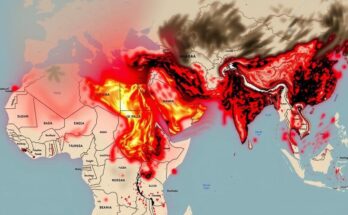Recent updates highlight significant humanitarian challenges in South Sudan, Syria, and Gaza, emphasizing escalating violence, medical supply shortages, and increased suffering among civilians. UN reports detail civilian casualties in South Sudan, urgent medical needs in Syria, and a tragic infant death due to hypothermia in Gaza, stressing the necessity for international assistance and protection for vulnerable populations.
Recent updates on humanitarian issues highlight severe challenges in South Sudan, Syria, and Gaza. In South Sudan, UN peacekeepers reported escalating communal violence that has led to an alarming increase in civilian casualties, including abductions and sexual violence. The UN Mission in South Sudan (UNMISS) detailed grim statistics from the previous year and condemned ongoing violence against civilians, particularly women. In Syria, the WHO’s recent humanitarian air charter aimed to address the medical needs of hundreds of thousands amidst a dire healthcare crisis exacerbated by years of conflict. Meanwhile, in Gaza, an alarming report emerged of a one-month-old infant succumbing to hypothermia, underscoring the urgent assistance needed for vulnerable populations. Prioritized aid deliveries, particularly for those in hard-hit areas, remain critically hindered by ongoing military actions and access restrictions.
In South Sudan, UNMISS has reported that violence has predominantly affected civilians, with 299 non-combatants killed and many others injured or abducted over a recent quarter. The organization noted that most fatalities occurred in Warrap State, where tensions between government forces and opposition groups further threaten community stability. UNMISS’s Nicholas Haysom urged local leaders to resolve disputes and called for accountability in human rights violations.
Turning to Syria, the WHO’s first humanitarian air charter of 2025 successfully delivered vital medical supplies to Damascus amidst ongoing efforts to reach affected communities. This charter follows previous aid efforts, including a recent mission to train paramedics on trauma care. The UN continues to support winterization efforts across the region, although explosive remnants of war remain a significant threat to civilians.
In Gaza, the humanitarian situation is deteriorating with reports of child deaths due to severe cold. In particular, OCHA emphasized the necessity to protect civilians and humanitarian infrastructure as hostilities continue. Comprehensive efforts must be made to facilitate access to besieged areas, where reports indicate that attempts by the United Nations to deliver assistance have been thwarted.
These developments illustrate the complex and urgent humanitarian needs in conflict-affected areas. The international community is urged to prioritize assistance to those who suffer most from violence and neglect. Continued advocacy for protected access and responsible humanitarian action is vital to alleviate the suffering evident in these regions.
The article provides a summary of pressing humanitarian crises occurring in South Sudan, Syria, and Gaza, as reported by various UN agencies. In South Sudan, ongoing communal violence is significantly impacting civilians, with a focus on abductions and sexual violence. The crisis in Syria includes a response from the WHO addressing serious medical needs amidst a lengthy conflict, while Gaza faces severe humanitarian challenges exacerbated by cold weather and sustained military action. Understanding these contexts highlights the urgent need for comprehensive humanitarian efforts and international cooperation.
To conclude, the current humanitarian crises in South Sudan, Syria, and Gaza demand immediate attention from the international community. Recent reports from UN agencies reveal devastating impacts on civilian populations, with increasing violence and undermined access to essential healthcare and aid. As communities continue to suffer, it is imperative that responsible global actions prioritize the protection and well-being of those impacted by conflict and instability.
Original Source: www.globalissues.org



